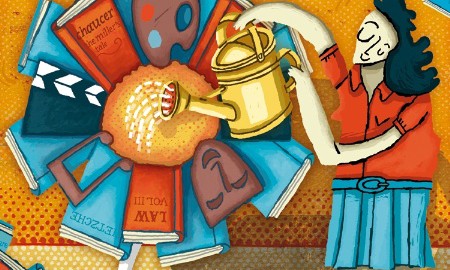by David Rempel, Guest Blogger
In response to “Why America’s obsession with STEM education is dangerous” from the Washington Post, March 26, 2015
This is what happens when you see people as functional components serving the economy; their humanity becomes an unnecessary and “expensive luxury”. We cannot base our future completely on what will serve the economy and provide jobs in existing markets. We need to maintain and nurture our abilities in creativity and innovation, as well as our understanding of ourselves and our place in the world. To give a few small examples: literature study teaches critical reading (through examining both fictional and non-fictional texts) that is absolutely necessary when making important decisions in any career. Learning to play an instrument teaches individuals to see the benefit of patience, perseverance, and the personal growth that can occur with dedication to a craft, and also builds collaborative skills and mental flexibility in a different way than any other subject can.
Furthermore, in this human-as-component view we rely entirely on tests and grades to show the worth of individuals. We constantly hear about ‘valuable exam data’ in schools, which in actuality merely shows how likely students are to be accepted into various universities — most of which blatantly disregard accepted educational theory and don’t prepare students for real-world jobs and (more importantly) real-world LIVES. Tests are primarily about memorization, which is the most basic part of any field (your “smartphone” can do this). Adapting and innovating are more advanced tasks. Of course, better-written tests can simulate real-world situations, and can require students to demonstrate far more than memorization, but it is still not real and not a true representation for their success in life, because it is an intentionally-structured, isolated example, and it isn’t the whole story of a student’s education.
Yes, there is a necessity to prepare students for contemporary life in a consumer-based world; yes, we definitely need technically-trained individuals to deal with all of our self-destructive problems; and yes, we therefore have a need to quantify success in specific skills. Yet we must also qualify the worth of the education they are receiving, and subsequently the worth of the societies we are creating. Students need to be balanced, well-rounded people who seek (and have the skills/knowledge to obtain) personal growth, understanding, and personal and cultural fulfillment.
David Rempel has a Masters of Education from the The College of New Jersey and teaches MYP Language & Literature at the American International School of Kuwait – an IB World school. David is passionate about engaging students in unique, authentic learning. He recently presented a workshop on Video Games in Education at NESA SEC 2014.

